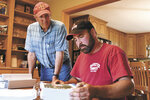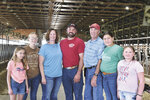

WEST UNION, Iowa — Stacks of thick binders containing myriads of evidence and court documents lay on dairy farmer Mark Vagts’ dining table. Each binder is a visual representation of the Vagts family’s three-year litigation battle. The Vagtses sued Northern Natural Gas after stray voltage affecting their cattle was found on their farm.
On June 21, litigation with Northern Natural Gas came to a close with a ruling in the family’s favor from the Iowa Supreme Court. In the court ruling, Vagts Dairy LLC was awarded $4.75 million in damages.
“We’re filling in a big economic hole,” Mark said. “We’re not building a mountain. We’re filling in a hole.”
Vagts Dairy is owned by Mark and his son, Andrew. They milk around 500 cows with the assistance of employees.
“It was very emotional, very stressful,” Mark said. “Our life has not been a lot of fun because of that.
The Vagts family said they went into mediation and felt Northern Natural Gas was not interested nor did the family feel they made effort to acknowledge the problem.
“Northern Natural Gas did not take us seriously,” Mark said. “It’s kind of like David versus Goliath or worse, ... we’re throwing stones and they’re fully armored.”
The Vagtses filed suit in March 2021. In January 2023, the jury ruled unanimously in their favor after a nine-day trial. After Northern Natural Gas appealed, it was taken before the Iowa Supreme Court in January.
The Vagts family’s farm was affected by DC stray voltage coming from a rectifier, anode bed and nearby natural gas pipeline. The DC current created a constant exposure for the family’s cows from the voltage. This caused their immune systems to be in a continually heightened state, putting the cows at risk for secondary issues.
The pipeline causing the issue was put in on the Vagts family’s farm in 1964. Over time, the coating on the pipes can erode, causing oxidation and rust. This natural gas pipeline used a cathodic protection system as required by federal regulations. This protects the pipe from oxidation by having DC current run on the encased pipes. To accomplish this, a rectifier converts alternating current power to DC power and sends it through the anode beds which act like a battery to electrify the pipeline.
In 2022, the Vagtses lost 76 cows, 27 of which they had to euthanize. Their herd death loss was over 17% — over three times the expected average of 5%.
Using Dairy Herd Improvement Association records, the Vagtses tracked death losses from over a decade and correlated them to the electrical activity. In 2013, Northern Natural Gas replaced the anode bed and the rectifier was turned off. At that time, their death loss dropped to 3%. Later that year, after the new anode bed and rectifier had been installed, the Vagtses began to observe abnormal cow behavior.
The Vagts family’s original freestall barn was built in 2000. Then, in 2017, they built on an addition which brought the end of their barn 200 feet closer to the pipeline. Animals in the Vagts family’s calving pen, which was closest, had the most problems.
The Vagtses had three waterers destroyed because their cows were standing in them during all months of the year to ground themselves while they drank. Building guards did not remedy the issue.
The stray voltage was especially hard on older cows.
“We’ve always pushed for longevity anyway, so that was really hurtful,” Mark said.
Their cows suffered from compromised immune systems, metritis, high somatic cell count, low components and high feed intake.
“It was terrible,” Mark said. “We were still maintaining, but ... we were losing our butts financially because we just weren’t getting components, which is a major driver of the market price.”
Not knowing what the problem was, the Vagts family looked into every aspect of their farm. They worked with their nutritionist and veterinarian; they investigated their milking equipment and other areas of the farm.
Finally, having exhausted their options, they brought in a stray voltage expert in September 2020, Lawrence Neubauer. Within 10 minutes he had detected stray DC voltage. Neubauer spent three days of testing, verifying and documenting his findings.
In less than a year from discovering this, the Vagts family sued Northern Natural Gas. The Vagts family also worked with Allamakee-Clayton Electric Cooperative which supplies power to Northern Natural Gas and to their farm to resolve several other issues outside court.
The Vagtses had a discovery day for their court case where around 27 people from the opposing counsel came to their farm to inspect for issues that could be causing the problem.
The Vagtses said they would advise someone going through a similar case to make sure every aspect of their operation is in order.
“They’re just looking at everything,” Mark said. “They’re just trying to find something that they can see that we might have done wrong (or to suggest that) we’re poor managers.”
At one point within the litigations process, Andrew was testing for stray voltage approximately every day. With this testing, they took photos with GPS location turned on to prove what was happening.
The Vagts family had to produce building plans, five years of financials, DHIA records, hoof trimming receipts, employee time sheets and more.
Andrew said it was frustrating to gather information for 3-4 years for the trial.
After the Vagts family’s lawsuit, in 2023 the rectifier was removed, the anode beds were removed and a third anode bed was discovered at the site and removed. They uncovered and rewrapped the pipeline for nine-tenths of a mile. Within that distance, the crew found approximately 100 compromised areas to the pipeline coating.
Even though the issues have been fixed, the problem has not fully gone away. The DC power must slowly drain from the farm soil, almost like a battery. This is different from AC stray voltage, which, when fixed, gives immediate relief to the cows. The Vagtses were told by their veterinarian that it may take up to two years.
“It takes time for that to deplete the current even though things are fixed, things are disconnected and moved out,” Andrew said.
Now that litigation is complete, the Vagtses can once again focus on being dairymen. Already, Mark said their cows’ health is better.
“We’re cautiously optimistic,” Mark said. “We’ve seen some improvements, but it’s not as quickly as what we’d like to see, of course.”
Comments
No comments on this item Please log in to comment by clicking here